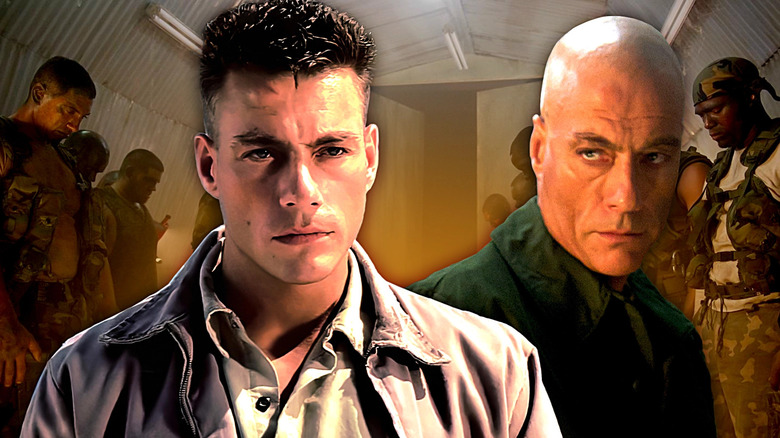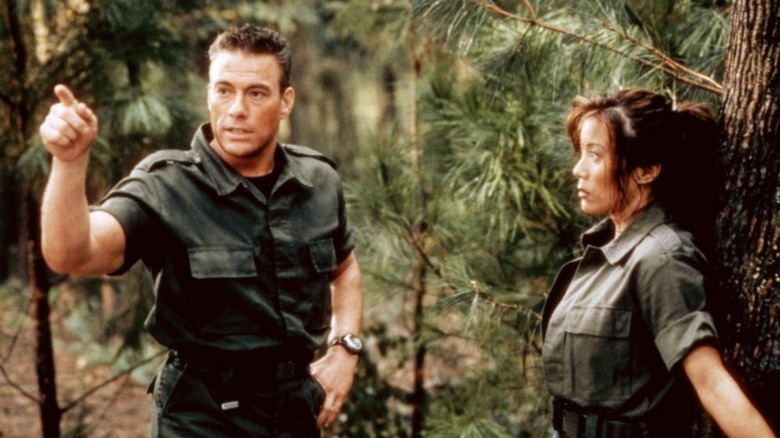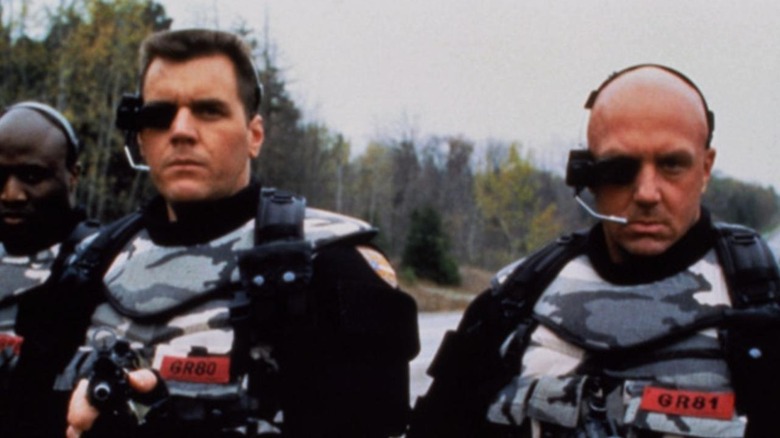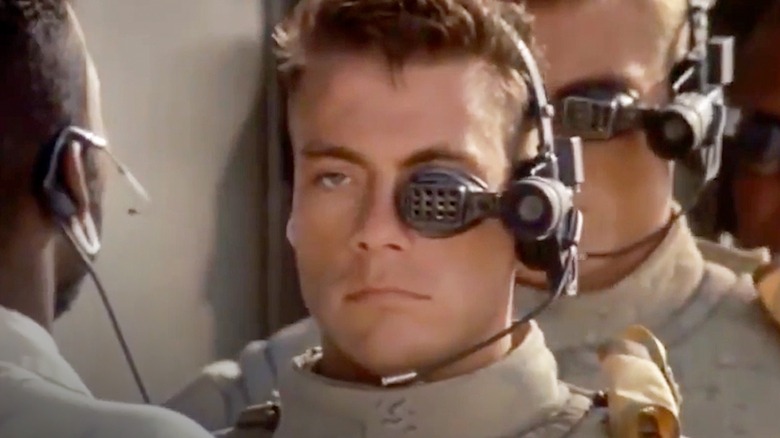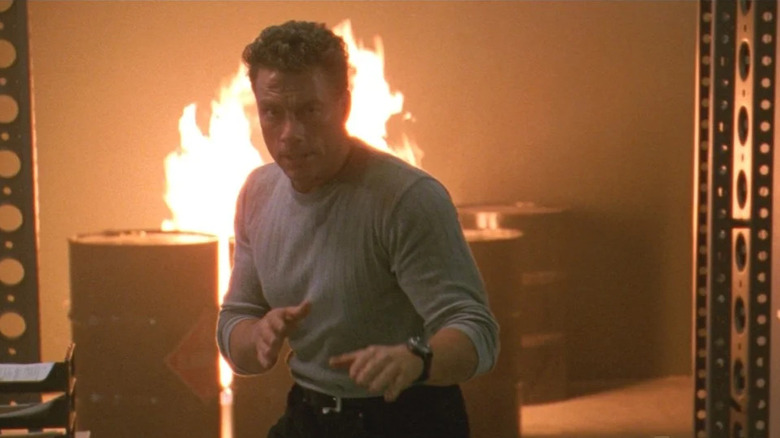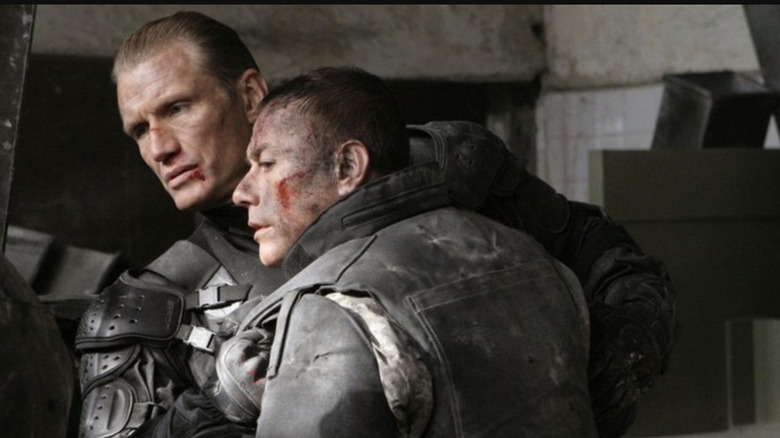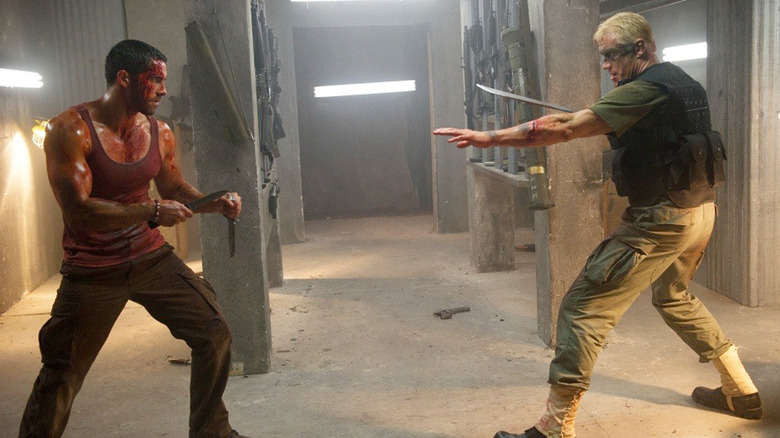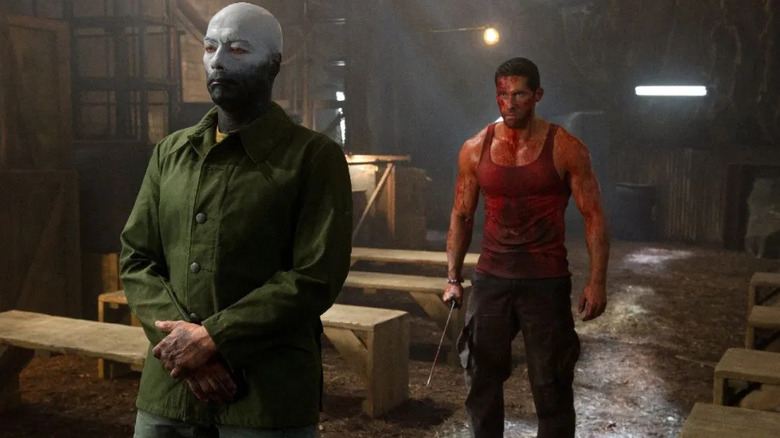The Correct Order To Watch Jean-Claude Van Damme's Universal Soldier Movies
Throughout humanity's long, sad, and seemingly endless history of making war, there has existed a naggingly evergreen question about making the perfect soldier. In a pre-technological age, this question was largely psychological, yet the advent of advanced tech started to open up more possibilities, as well as lead to more dead-ends. To wit: while fully replacing human soldiers with robots would initially seem ingenious, it could also lead to things like malfunctions and the absence of human reasoning and ingenuity. Yet a robot, loaded with a pre-made algorithm, doesn't need to be retrained, and isn't susceptible to the many vulnerabilities a human being is. Surely, there must be a way to combine the two.
Roland Emmerich's 1992 sci-fi action film "Universal Soldier" took this recurring military frustration and turned it into thoughtful genre entertainment. Although Emmerich and his writers (with his old filmmaking partner Dean Devlin chief among them) knew they were aiming to make a popcorn action flick, they spiced their film with a heady mixture of themes from prior intellectual action movies like "First Blood" and "RoboCop," not to mention horror films involving the resurrection of the dead. This genre stew resulted in not just a pulse-pounding early '90s slice of action, but a franchise which impressively only dove deeper into the series' rich thematic material with each entry.
It's this continued commitment to the ideas behind the story and characters alongside the action itself that has encouraged franchise stars Jean-Claude Van Damme and Dolph Lundgren to appear in the majority of the series, despite some of the sequels not receiving a theatrical release. Although the "Universal Soldier" franchise is only made up of six movies, two of the films are TV movie offshoots (more on them later), and one appears to be out of continuity with the rest, despite starring Van Damme. Since the two TV movies are part of an offshoot continuity and feature none of the original film's stars, it's best for a newcomer to stick to the "Universal Soldier" films starring Van Damme. Those movies are:
- Universal Soldier (1992)
- Universal Soldier: The Return (1999) (optional)
- Universal Soldier: Regeneration (2010)
- Universal Soldier: Day of Reckoning (2012)
With these four movies watched in that order, you're in for a (Van) Damme good ride.
Why is that the correct order to watch the Universal Soldier movies?
Like with so many franchises, the correct order to watch the "Universal Soldier" movies is in the order of their release. While this holds true for series with even the wildest timeline shenanigans (hello, "Fast and Furious"), in the case of this franchise, each installment builds thematically, tonally, and stylistically upon the last. You might notice I didn't say "narratively," and that's because, with a few small exceptions, the "Universal Soldier" movies are not a continuity-heavy series. In fact, I could almost say that each installment is a stand alone film, at least in terms of them not requiring deep knowledge of the prior films in order to watch and enjoy them.
The reason you probably wouldn't want to view any of the films cold (save the original, of course) is that all of the sequels do require some familiarity with the original 1992 "Universal Soldier." That applies to the general premise of the Universal Soldier program and the Universal Soldiers themselves (aka UniSols, for short) as well as the backstory of Luc Deveraux (Van Damme) and Andrew Scott (Dolph Lundgren). So, as long as you've seen the original film, you could conceivably jump into any of the sequels and not be lost; as a matter of fact, it may make things less confusing from a character/plot continuity perspective, especially where "The Return" is concerned. While the movie is absolutely conceived as a direct sequel to the original film, some plot elements are introduced a little strangely — for instance, gone is Deveraux's love interest from the first film, replaced by a new woman and the couple's daughter.
Making things more odd is "Regeneration" seemingly soft retconning "The Return," with the movie and its depiction of Deveraux not referencing or explaining the events that occurred in the prior film. So, while using the old "head canon" trick could somehow make "The Return" fit in with the rest of the films, it's an entry that is wholly optional when considering the larger continuity. For my money, I love seeing Bill Goldberg and Michael Jai White tear it up as some deadly UniSols, so I vote to keep it included!
Is there another way to watch the Universal Soldier movies?
As stated above, you could alternatively watch the "Universal Soldier" saga by skipping the sort-of-out-of-continuity "The Return" and watching just the first film and John Hyams' sequels:
- Universal Soldier (1992)
- Universal Soldier: Regeneration (2009)
- Universal Soldier: Day of Reckoning (2012)
For those who find "The Return" to be either too much of an odd fit or too awkwardly late-'90s Van Damme for their tastes, this is their preferred order. There is, however, a third continuity that you can follow if you wish, though neither myself nor pretty much anyone I can think of would recommend it. That would involve watching the original film followed by two made-for-television sequels:
- Universal Soldier (1992)
- Universal Soldier II: Brothers in Arms (1998)
- Universal Soldier III: Unfinished Business (1998)
For one thing, this track is not recommended given that the two TV sequels feature none of the original actors from the first film, let alone Van Damme. Instead, Luc is recast with former linebacker Matt Battaglia, and the story concerns Luc and his girlfriend learning about how his long-lost, presumed dead older brother is still alive and has been conscripted as a UniSol by a crooked security consultant and a shady CIA director. Sure, that plot does sound intriguing, as does the fact that the security consultant is played by Gary Busey and the CIA director is played by Burt Reynolds. Yet trust me when I say that these two films are a couple of the most boring movies you'll ever have the displeasure of sitting through. Originally developed as the start of a proposed syndicated "Universal Soldier" TV series, all plans for a show were abandoned once people got a look at the finished films and realized watching paint dry was more rewarding. View them at your peril.
Universal Soldier — the ghosts of Vietnam
In general, the first "Universal Soldier" works as a riff on James Cameron's "Terminator 2," a movie in which a genetically enhanced super soldier is on the run from another genetically enhanced super soldier, one who may be his superior in terms of strength and certainly is in terms of insane determination. The other sci-fi/horror elements within the film's worldbuilding only add to the compelling ethical and moral questions underlying the concept. It's one thing to have a super soldier, it's quite another thing to have them be actual human beings who have not only lived beyond their years, but have been robbed of their souls and control of their own lives.
Yet the most potent element of the script cooked up by Richard Rothstein, Christopher Leitch and Dean Devlin is the fact that both Deveraux and Scott are Vietnam War veterans. Although the movie's early '90s release date puts it at the tail end of the wave of Vietnam revisionism flicks (as seen in the "Rambo" films as well as "Missing in Action," "Platoon," etc.), it still has a vibrancy to its political and cultural commentary, seen most clearly in the scene where a newly awakened Scott freaks out in the middle of a supermarket. In the same way that the "Terminator" films brought the potential scourge of the future to the present's doorstep, "Universal Soldier" keeps the curse of America's past alive in a way that's more immediate than the sight of a veteran on a street corner.
Universal Soldier: The Return — SkyNet, with more whey powder
Where the first "Universal Soldier" was a heady mix of sci-fi, horror, action and social commentary, "The Return" condenses all of that into a more run-of-the-mill mid-budget sci-fi tinged action flick. To its credit, the film does continue the series' "Terminator" homage — faithfully, if not subtly, as it introduces a SkyNet-like AI computer, the Self-Evolving Thought Helix (or S.E.T.H. for short), which is now the primary connective tissue between all the new UniSols, the 2500 generation (Deveraux is, of course, an older model). When the government elects to make some budget cuts and effectively shutter the UniSol program, S.E.T.H. goes haywire in its effort for self-preservation, throwing itself into a rockin' bod (Michael Jai White) and using its control over all the new-gen UniSols to attempt a hostile takeover of America (and possibly ... the world??).
So yes, "The Return" is far more of a goofy action movie than its predecessor (which is probably the biggest retroactive compliment a Roland Emmerich film can get). Yet while it doesn't have much in the way of social commentary and even less in character development (no mention is made of Luc's girl Friday love interest from the first movie, he's been changed back to a normal human, and we're supposed to take it on faith that he started a family without much complication), it has its genre charms. No doubt that's thanks to the B-movie cocktail of screenwriters William Malone and John Fasano, veterans of many a low-budget genre picture, and stunt coordinator-turned-director Mic Rodgers, who bring just the right mix of unseriousness to a film that probably would've collapsed had it been a smidgen more intelligent.
Universal Soldier: Regeneration — immortality and death as a singularity
Although director John Hyams and writer Victor Ostrovsky retain a bit of the "Terminator" spice in their soft reboot of the series, the nut that "Regeneration" really cracks into is the original movie's commentary about the military, the treatment of soldiers as individuals, and how the horrors of war are only compounded when a soldier is never allowed to perish. There's a little bit of continuity (depending on your acceptance of "The Return" as an official entry) with regards to Deveraux being called back into active service after spending the intervening years unsuccessfully trying to reintegrate into modern society, insofar as perhaps Luc isn't just being reactivated, but re-transformed into a UniSol again. In either case, his return to the fold is treated more like tragedy than anything else, a comment on how soldiers can be perceived as only as good or useful as the job they were trained to do.
This theme is delved into even further when Andrew Scott re-enters the picture, and what's impressive is how his character is used in a way that feels chillingly real rather than arch. What could've been a "Frankenstein" or even "Re-Animator"-esque approach to the character ends up feeling more soulful, allowing the character to retain his menacing insanity while seeming more human than monster. Other than the gritty, gnarly action sequences and violence, "Regeneration" proves that Hyams' main contribution to the series is pivoting it from a more upbeat genre lark to a very downbeat, meditative action drama, one in which the line between hero and villain is thoroughly muddled.
Universal Soldier: Day of Reckoning — enter the void
That blurring of moral lines is only deepened in "Day of Reckoning," a movie that sees the franchise move further away from its James Cameron inspiration into a space that's more influenced by David Lynch and Gaspar Noé. Here, Deveraux and Scott are relegated to supporting roles, with the entire movie centering around the new character of John (Scott Adkins), a man who makes the horrifying discovery that he's actually a UniSol, not to mention that there may be more than one of him out there. Yep, Hyams and his co-screenwriters Doug Magnuson and Jon Greenhalgh continue expanding the series' sci-fi trappings, introducing the concept of cloning into the UniSol mixture and further complicating the moral and ethical quandaries while adding a heaping helping of existential dread.
Although Hyams' tonal approach from "Regeneration" is essentially furthered with this film (including and especially the gory action, which garnered this movie an NC-17 director's cut), his technique is completely different, choosing to open the movie in a first-person POV and then shooting the rest in a fluid, trance-like manner which enhances the film's surreality. The good guy/bad guy switcheroo game is complicated even more here, with the script turning Deveraux into its main antagonist, only to reveal that perhaps John is his own true worst enemy. While the movie ends on what could be considered a cliffhanger — and thus it feels unfortunate that there may not be a follow-up to it — it's ultimately impressive that "Universal Soldier" goes out on a high note, and a bleak one to boot.
The Jean-Claude Van Damme Universal Soldier movies commit to a bleak, uncompromising story
Although there are several franchises that manage to retain their quality despite the absence of one or all original cast members, the "Universal Soldier" series is one that adheres to the conventional wisdom that the entries featuring Van Damme are the only ones worth watching. Interestingly, this isn't for reasons of continuity or longform storytelling — as I said before, there are some wonky aspects to the canon (especially if "The Return" is included), and the series as a whole isn't telling some multi-part narrative. In this way, "Universal Soldier" is an old-school action franchise, the kind where prior knowledge isn't a prerequisite for enjoyment.
Yet while there isn't a strict narrative throughline to the franchise, the films absolutely have an overarching thematic development, one which is particularly bleak and uncompromising. Although "Universal Soldier" and "The Return" are, by and large, rather jocular action adventures, their respective filmmakers do right by the sci-fi and horror themes inherent in the premise. The US government is portrayed as morally suspect for implementing the UniSol project in the first place, and the people behind creating it are essentially Victor Frankensteins, unscrupulous scientists playing around with life and death. Even though the UniSol project seems relatively squeaky clean by the time of "The Return," S.E.T.H. provides some good cautionary tale material in a very "Terminator"-like fashion.
The impressive success of "Regeneration" and "Day of Reckoning" lies not just in Hyams' inspired direction (particularly seen in the David Lynch/Gaspar Noé-influences of the latter film) but the way that both films deemphasize the jocularity and play up the inherent grit and depth of the premise of soldiers who are continually forced to wage war. The UniSols are human beings whose lives consist of constant violence, and yet are never granted the grace of death. Without spoiling too much, one of the most satisfying aspects of where the series ends up is that the government may have gotten what they wished for — the ultimate soldier — in the worst way possible. Ironically, what acts as a perpetual hell for the UniSols is our hope: who knows if the "Universal Soldier" franchise can truly be laid to rest or if it'll be resurrected once again sometime in the future. Whatever the case ends up being, you'd best catch up on your mission briefing sooner rather than later.
